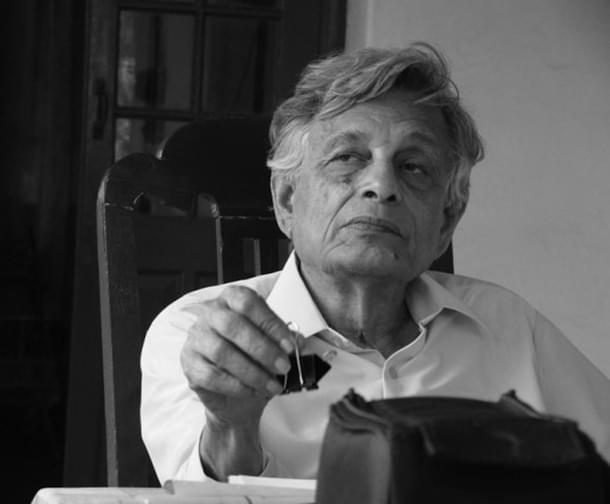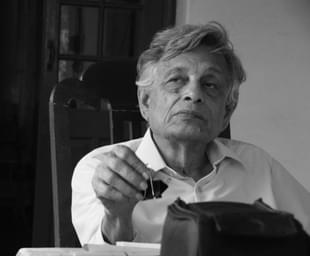Books
Anybody Who Didn’t Agree With Irfan Habib Was Branded ‘Hindutvawadi’: Archaeologist In Autobiography
Jayakrishnan Nair
Sep 07, 2016, 02:23 PM | Updated 02:22 PM IST
Save & read from anywhere!
Bookmark stories for easy access on any device or the Swarajya app.


A few decades ago, at the Aligarh Muslim University (AMU), Professor Irfan Habib summoned his former student and now faculty member, K K Muhammed, to his office. Muhammed had discovered the Ibadat Khana in Fatehpur Sikri. Built by Akbar in 1575 CE, the Ibadat Khana was the place where various religious scholars held discussions. A major discovery, this was reported in various newspapers, something which Prof. Habib was not too happy about. The conversation went as follows:
Irfan Habib: “This is not Ibadat Khana.”
Muhammed: “No? This is not Ibadat Khana?”
IH: “What you gave in Times of India is not Ibadat Khana.”
M: “How can you say that? Are you an archaeologist?”
IH: “I may not be as good an archaeologist like you.”
M: “Sorry, you are not an archaeologist.”
Prof. Habib was speechless.
He pushed a paper towards Muhammed and said, “write what you discovered is not Ibadat Khana”. Muhammed refused and walked away.
After working both at the AMU and the Archaeological Survey of India (ASI) in various designations, Muhammed has now written an autobiography in Malayalam, titled ഞാനെന്ന ഭാരതീയൻ (Me, the Indian), which has details of his encounters with Prof. Habib and his cabal. As part of his education, Muhammed learned how a historian becomes secular.
When Muhammed reached the AMU as a student, he was initially excited to have someone as famous as Prof. Habib as his teacher. But Muhammed recollects from a later time, “As a teacher, he did not make any impact on me.” His other classmates too had a similar opinion. This news reached Habib’s ears. Muhammed ran for the Student’s Union as a Congressman. This too did not go well with the Marxists, and they decided to contain him. This would cause various encounters between the Irfan Habib group and Muhammed. The details of these conflicts are there in the first few chapters of the book.
Due to some manoeuvres by the Marxists, Muhammed did not get admission as a researcher and, hence, opted for archaeology. After completing his postgraduate diploma in it, he returned to the AMU. He thanks Habib for blocking his path, because it led him to archaeology, and it was here that he made a name for himself by discovering not just the Ibadat Khana but also a Christian Church which Akbar had built for the missionaries.
The Marxist attack came in multiple ways. First, they tried to prove that the discovery was not Muhammed’s. That failed. The second attack claimed that if Muhammed had discovered this, then it could not be the Ibadat Khana. Soon after that, Habib became the Head of Department at the university and that’s when the direct confrontation mentioned earlier happened.
Muhammed was a Communist sympathiser, but what he encountered in the campus was a new form of Communism. The petty version.
The Habib group could cause career damage. They controlled the purse strings. They could decide who got scholarships or who would be admitted as researchers. If you were not part of his group, you were branded communal. Independent thinking was anathema. But if you joined his group, you became “secular”.
For this, Muhammed cites the example of Prof. Ramachandra Gaur, with whom he worked. An enemy of Habib, Prof. Gaur was branded a Rashtriya Swayamsevak Sangh (RSS) man. Once he became the Head of Department, he changed his allegiance. Gaur also advised Muhammed that it was better to switch to Habib’s group for career advancement. Once Prof. Gaur joined the Habib group, he was considered “secular”. Muhammed says he refused to follow Gaur’s example.
Another encounter he mentions occurred in front of an interview panel consisting of, among others, the Vice Chancellor and Prof. Habib. During the interview, the Vice Chancellor said he could not consider anyone for the AMU who did not respect Prof. Habib. Muhammed replied that respect had to be earned, not demanded. He mentioned how a person who got lesser marks than him was admitted as a researcher.
Another case was when someone with lesser marks and no postgraduate diploma was given the post of Assistant Archaeologist instead of him. Muhammed also had evidence against a false accusation that Prof. Habib had made. While Muhammed said all of this, Prof. Habib sat with his eyes down. Muhammed writes, “His behavior towards me changed, but I was sure he would stab me at the first opportunity.”
Muhammed writes that Prof. Habib preferred people who flattered him like Makkan Lal. He tried to get Prof. Lal as the deputy director instead of Muhammed. When this was challenged by Muhammed in court, Prof. Lal became an ally of Prof. Habib’s.
Muhammed writes, “Unholy alliances are short lived.” By the time of the World Archaeology Congress in Delhi, the Habib group and Lal group were openly fighting, and in the Babri Masjid dispute, Prof. Habib and Prof. Lal were on the opposite sides.
Muhammed was finally selected as Deputy Superintending Archaeologist at the ASI. According to Muhammed, Prof. Habib met the Director General of ASI and asked him to reject him. The DG replied that it was a UPC selection and he did not have the power to reject it. Then Prof. Habib had one final request. Don’t post him in Agra. (What if he discovers something else). Muhammed was posted to Madras Circle. But he would visit AMU for lectures and then efforts were made to block them. The only place where they were successful in blocking him was at Jawaharlal Nehru University (no big surprise there), but everywhere else Muhammed was able to speak freely.
In the foreward to his book, Prof. M G S Narayanan too writes about Prof. Habib. According to Prof. MGS, Prof. Habib has poisoned not just history but culture and social life by his narrow groupism, nepotism and treachery. At the same time, he writes that Prof. Habib is a hard-working person but crafty. His group would threaten, cheat and would be part of various intrigues. Anyone who criticised this group would be branded a Hindutvawadi and a communalist. At the same time, Prof. MGS says Prof. Habib is not a Muslim fundamentalist. He is not sure even if he is a believer. Prof. MGS attributes this group for making Babri Masjid a national issue.
According to Muhammed, it was during the Babri Masjid dispute time that Habib’s mask of secularism came off. As the head of a government body (Indian Council of Historical Research), he should not have taken sides in the dispute. People saw this as an effort to increase his influence by taking sides with the Muslim side in the dispute. The one historian who had the courage to say that the head of ICHR should not take sides in the dispute was Prof. MGS, who initially had a great opinion of Prof. Irfan Habib.
He even disagreed with Muhammed on his opinion of Prof. Habib.
But Once Prof. MGS worked with Prof. Habib in ICHR, he realised the truth of Muhammed’s statements. Not being able to work with Prof. Habib, he left ICHR. Very soon Prof. MGS was branded with the Hindutva label.
These are just a few select incidents from the first few chapters of the book. It is these people who get to define Indian history on whether a Ram temple existed or if Saraswati flowed in India or in Afghanistan (see The Lost River). This is the price for continuing the British practice of having an “official” history. We have become bystanders while our history has been hijacked by Marxists like Prof. Irfan Habib.
This piece was first published on Varnam and has been republished here with permission.
See Also-
Leftists Scuttled Settlement On Ayodhya. But What Lies Beneath The Babri Masjid Site?
Image credits: Amber Habib/Wikimedia Commons
Jayakrishnan Nair is a history enthusiast, not bound by the politics and preconceptions in the field.





